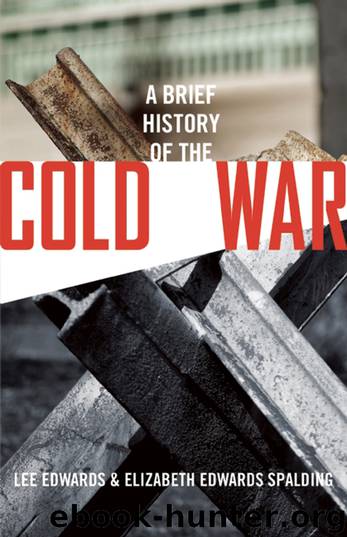A Brief History of the Cold War by Lee Edwards

Author:Lee Edwards
Language: eng
Format: epub
ISBN: 9781621575412
Publisher: Regnery Publishing
AFGHANISTAN
After a string of notable foreign policy successes, the Soviets were about to encounter an unexpected setback. In October 1979, Hafizulah Amin, a formerly reliable communist politician, engineered a coup in Afghanistan, ousting his pro-Moscow rival and provoking the Kremlin to intervene and establish a pro-Soviet government. On December 27, 1979, Soviet special forces killed Amin and replaced him with a Soviet puppet. The Soviet Union found itself directly involved in an Afghan civil war.
By the time the chastened Soviets withdrew in February 1989, they had suffered 13,826 dead and 49,985 wounded. Afghanistan was the Soviet Union’s Vietnam, a quagmire from which it could not extricate itself for nearly a decade.30
Admitting after the Soviet invasion of Afghanistan that he had learned more about communism in one week than he had in a lifetime, Carter initiated a series of anti-Soviet actions. He justified his new hard-line policy by exaggerating Moscow’s entry into Afghanistan as “the greatest threat to peace since the Second World War.”31 He withdrew the SALT II treaty from Senate consideration. He embargoed grain imports to the Soviet Union. He announced that the United States would boycott the 1980 Olympics in Moscow. But he still insisted that he supported détente, puzzling U.S. foreign policy experts and causing the Soviets to wonder what he meant.
In January 1980 the president suddenly proclaimed the Carter Doctrine: any attempt by an outside power to gain control of the Persian Gulf would be regarded as a “direct assault on the vital interests of the United States,” to be repelled “by any means necessary, including military force.” As one historian wrote, reports of the demise of containment “had been somewhat exaggerated.”32
Having entered the White House with a grand strategy to transcend long-held American fears about communism and to end the Cold War, President Carter was caught up in what he called Soviet “expansionism.” Defeated in the election of 1980 by the conservative Ronald Reagan, Carter left office with Soviet-American relations at their lowest ebb in a decade and the Cold War seemingly fated to last for years to come.33
Download
This site does not store any files on its server. We only index and link to content provided by other sites. Please contact the content providers to delete copyright contents if any and email us, we'll remove relevant links or contents immediately.
| Arms Control | Diplomacy |
| Security | Trades & Tariffs |
| Treaties | African |
| Asian | Australian & Oceanian |
| Canadian | Caribbean & Latin American |
| European | Middle Eastern |
| Russian & Former Soviet Union |
The Secret History by Donna Tartt(16621)
The Social Justice Warrior Handbook by Lisa De Pasquale(11489)
Thirteen Reasons Why by Jay Asher(7788)
This Is How You Lose Her by Junot Diaz(5769)
Weapons of Math Destruction by Cathy O'Neil(5036)
Zero to One by Peter Thiel(4824)
The Myth of the Strong Leader by Archie Brown(4789)
Promise Me, Dad by Joe Biden(4447)
Beartown by Fredrik Backman(4415)
Stone's Rules by Roger Stone(4415)
How Democracies Die by Steven Levitsky & Daniel Ziblatt(4398)
The Fire Next Time by James Baldwin(4342)
100 Deadly Skills by Clint Emerson(4076)
A Higher Loyalty: Truth, Lies, and Leadership by James Comey(4032)
Rise and Kill First by Ronen Bergman(4012)
The David Icke Guide to the Global Conspiracy (and how to end it) by David Icke(3881)
The Farm by Tom Rob Smith(3872)
Secrecy World by Jake Bernstein(3782)
The Doomsday Machine by Daniel Ellsberg(3730)
